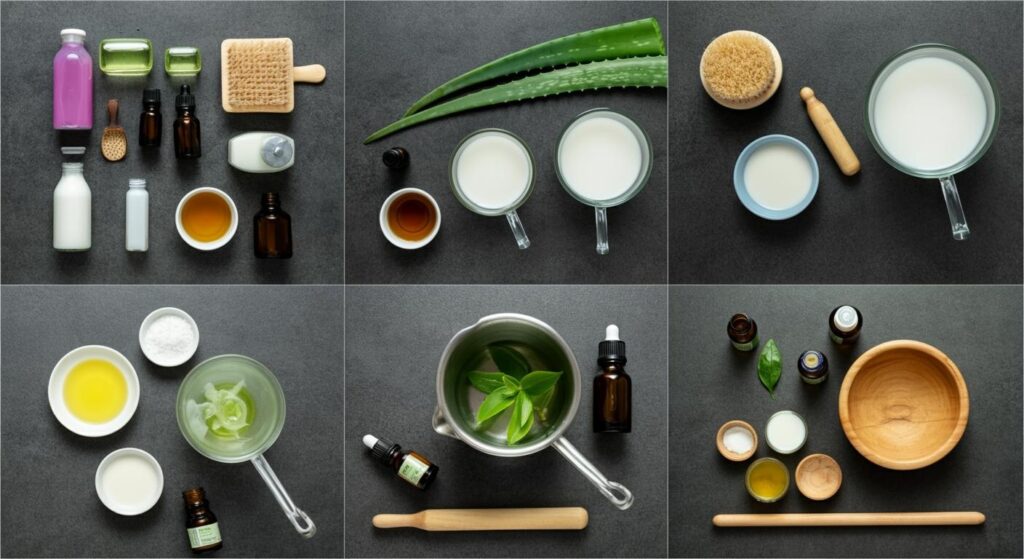Table of Contents
Sensitive skin can be challenging to manage, with common issues like redness, irritation, and dryness triggered by everyday environmental factors or harsh skincare products. For individuals facing these challenges, choosing natural skincare ingredients offers a gentle and effective way to soothe and protect the skin.
Unlike conventional products filled with synthetic chemicals, natural ingredients tend to be free from harsh irritants, making them ideal for calming sensitive skin.
The beauty of natural ingredients lies in their ability to hydrate, repair, and shield the skin’s delicate barrier without causing additional flare-ups
From soothing botanicals to nutrient-rich oils, many natural ingredients are packed with anti-inflammatory and antioxidant properties, making them powerful allies in treating sensitive skin. Whether you’re dealing with chronic sensitivity, occasional irritation, or environmental stressors, incorporating these natural elements can offer both immediate relief and long-term protection.
This article will explore the best natural skincare ingredients for sensitive skin that can transform your skincare routine, allowing you to enjoy healthier, more balanced skin.
Understanding Sensitive Skin
Sensitive skin is a condition that affects millions of people globally, characterized by an increased reactivity to various external factors. It typically manifests through symptoms such as redness, burning, stinging, dryness, and itchiness.

Characteristics of Sensitive Skin
Sensitive skin can be identified by its tendency to react quickly to changes in the environment or new skincare products. Common signs include:
- Redness or flushing: A key indicator of sensitivity, redness often appears in response to irritants or environmental changes.
- Dryness and flakiness: Sensitive skin often struggles with moisture retention, leading to a dry, tight feeling.
- Itching, burning, or stinging: A sensation of discomfort can occur when using products with certain ingredients or when exposed to environmental stressors.
While some individuals may be born with sensitive skin, others may develop it over time due to various triggers.
Common Triggers for Sensitive Skin
Several factors can exacerbate sensitive skin, often resulting in flare-ups or worsening symptoms. These triggers include:
- Environmental factors: Harsh weather conditions, pollution, and excessive sun exposure can compromise the skin’s protective barrier, leading to irritation.
- Skincare products: Many mainstream skincare products contain harsh chemicals, synthetic fragrances, or alcohol, all of which can irritate sensitive skin.
- Allergens: Ingredients like parabens, sulfates, or artificial dyes are common allergens that can trigger reactions in individuals with sensitive skin.
- Stress: Emotional stress or lack of sleep can weaken the skin’s natural defenses, making it more reactive.
These triggers highlight the importance of paying close attention to the ingredients in skincare products and understanding what your skin can tolerate.
Choosing Safe and Gentle Ingredients
For individuals with sensitive skin, selecting safe natural skincare ingredients is crucial to avoid irritation and maintain skin health. Natural ingredients, such as aloe vera, chamomile, and colloidal oatmeal, offer soothing and anti-inflammatory properties, which help calm the skin without causing adverse reactions. These ingredients are not only gentle but also nourishing, helping to restore and protect the skin’s natural barrier.
Choosing products that focus on natural ingredients for skincare and are free from harmful additives is essential in managing sensitive skin effectively.
By avoiding harsh chemicals and opting for plant-based alternatives, individuals with sensitive skin can significantly reduce the risk of flare-ups and maintain a more balanced, healthy complexion.
Top Natural Ingredients for Sensitive Skin
Sensitive skin requires extra care, and choosing the right skincare ingredients is crucial to avoiding irritation and supporting a healthy complexion. Natural ingredients are often the best choice because they are free from harsh chemicals and provide gentle, soothing benefits.
Below are some of the best natural skincare ingredients that are both safe and effective for sensitive skin, along with their specific benefits, usage tips, and potential side effects.
Aloe Vera
- Benefits: Aloe vera is renowned for its soothing, anti-inflammatory, and hydrating properties, making it a top choice for calming sensitive or irritated skin. The gel from the aloe plant contains polysaccharides, which help lock in moisture, and it also has cooling properties that can instantly relieve redness and inflammation.
- Usage Tips: Aloe vera is perfect as a daily moisturizer or as a spot treatment for areas of irritation, sunburn, or dryness. It can be applied directly to the skin or found in various gels, serums, and creams.
- Potential Side Effects: Aloe vera is generally safe, but some individuals may experience slight irritation, especially when using products with synthetic additives.
- Product Recommendation: Look for organic, 100% pure aloe vera gel or products where aloe is listed as the primary ingredient.
Chamomile Extract
- Benefits: Chamomile is celebrated for its powerful anti-inflammatory and antioxidant properties. This botanical extract helps reduce redness, soothe irritated skin, and promote a more even complexion. It’s especially beneficial for sensitive skin types prone to conditions like rosacea or eczema.
- Usage Tips: Chamomile extract is often found in calming creams, toners, and facial mists. It can also be used as a facial compress or in masks for targeted soothing benefits.
- Potential Side Effects: While chamomile is generally considered safe, individuals allergic to plants in the Asteraceae family (like ragweed) should use it with caution.
- Product Recommendation: Chamomile-infused creams or gentle toners designed specifically for sensitive skin offer the best results.
Shea Butter
- Benefits: Shea butter is a deeply moisturizing ingredient that provides a protective barrier on the skin, locking in moisture and shielding against irritants. Rich in essential fatty acids and vitamins, it helps to nourish the skin while improving its elasticity. Its anti-inflammatory properties also help soothe dry, irritated patches.
- Usage Tips: Shea butter is excellent for use as a daily moisturizer, especially on dry or flaky areas. It can be found in body lotions, face creams, or used in its raw form for intense hydration.
- Potential Side Effects: Shea butter is generally well-tolerated but can be too rich for some, especially those with oily or acne-prone skin. It’s best to test on a small area first.
- Product Recommendation: Opt for pure, unrefined shea butter or products that use a high concentration of this ingredient for optimal hydration.
Jojoba Oil
- Benefits: Jojoba oil is highly compatible with the skin because it closely mimics the skin’s natural sebum. This makes it a fantastic moisturizer that absorbs quickly without clogging pores, which is especially important for sensitive skin types prone to breakouts. It helps balance oil production while providing hydration and protection.
- Usage Tips: Jojoba oil can be used as a facial oil, mixed into your moisturizer, or applied as a makeup remover. It’s also ideal for soothing dry scalp issues or as a body oil.
- Potential Side Effects: Jojoba oil is non-comedogenic and generally very safe, but as with any oil, it’s best to patch test to rule out any individual sensitivities.
- Product Recommendation: Look for 100% pure, organic jojoba oil to maximize benefits without additional fillers.
Squalane
- Benefits: Squalane is a lightweight, non-greasy moisturizer that helps restore the skin’s barrier and balance moisture levels. It’s derived from plants like olives and is highly effective at hydrating sensitive skin without clogging pores. Squalane helps calm redness, irritation, and dry patches, making it ideal for even the most reactive skin.
- Usage Tips: Squalane is versatile and can be used in serums, moisturizers, and facial oils. Apply it after cleansing and before heavier creams to lock in hydration.
- Potential Side Effects: Squalane is generally considered non-irritating and is safe for all skin types, though some may find it too rich if applied in excess.
- Product Recommendation: Choose plant-based squalane (usually derived from sugarcane or olives) for sustainable and effective hydration.
Calendula Extract
- Benefits: Calendula is a gentle, antioxidant-rich botanical that promotes skin healing and soothes inflammation. It’s particularly beneficial for sensitive or damaged skin, as it accelerates the healing of minor wounds, reduces redness, and combats free radicals that can worsen sensitivity.
- Usage Tips: Calendula extract is often found in balms, ointments, and creams designed for sensitive or irritated skin. It’s also great for use in masks or serums aimed at calming inflammation.
- Potential Side Effects: Calendula is generally safe, but individuals allergic to the Asteraceae family should be cautious.
- Product Recommendation: Look for calendula-rich creams or serums designed to soothe and restore sensitive skin.
Rosehip Oil
- Benefits: Rosehip oil is rich in vitamins A and C, as well as essential fatty acids that promote skin regeneration and repair. It helps reduce redness, improve skin tone, and restore the skin’s natural barrier. Its lightweight texture makes it ideal for sensitive skin types seeking hydration without clogging pores.
- Usage Tips: Use rosehip oil as part of your evening skincare routine to nourish and repair the skin overnight. It can also be mixed with your moisturizer or used on its own as a hydrating serum.
- Potential Side Effects: Rosehip oil is generally non-comedogenic, but individuals with extremely sensitive skin should perform a patch test to ensure it doesn’t cause irritation.
- Product Recommendation: Opt for cold-pressed, organic rosehip oil for maximum potency and purity.
DIY Natural Skincare Recipes for Sensitive Skin
Creating your own skincare products at home allows you to control the ingredients, ensuring they are safe and suitable for sensitive skin. DIY natural skincare ingredients not only offer customization based on your skin’s unique needs, but they also eliminate the risk of synthetic additives and preservatives that can irritate sensitive skin.

Here are three simple and effective DIY recipes using natural skincare ingredients for home use that cater specifically to sensitive skin.
Soothing Aloe Vera Gel
Aloe vera is well-known for its calming and hydrating properties, making it an essential ingredient for sensitive skin. This DIY aloe vera gel is perfect for soothing irritation, redness, and dryness.
Ingredients:
- 1 large aloe vera leaf (or 2 tbsp of pure aloe vera gel)
- 1 tsp of vitamin E oil (optional for added moisture)
- 3-5 drops of lavender essential oil (optional for added calming effect)
Instructions:
- Cut the aloe vera leaf lengthwise and scoop out the gel using a spoon.
- Blend the gel in a blender or whisk it until smooth.
- Add the vitamin E oil and lavender essential oil, and mix well.
- Store the gel in a clean jar and keep it refrigerated for up to 2 weeks.
Usage: Apply the aloe vera gel directly to irritated areas or use it as a daily moisturizer. It’s also excellent for soothing sunburns or rashes.
Customization Tip: Add a few drops of tea tree oil if you have sensitive but acne-prone skin, as it will help control breakouts while still soothing irritation.
Chamomile Infused Oil
Chamomile is an incredible ingredient for calming inflammation and reducing redness, making it ideal for sensitive skin. This infused oil can be used for massages, as a face oil, or even as a base for homemade creams.
Ingredients:
- 1/2 cup dried chamomile flowers (or 4-5 chamomile tea bags)
- 1 cup carrier oil (jojoba oil or sweet almond oil work best)
- A clean glass jar
Instructions:
- Place the dried chamomile flowers or tea bags into the glass jar.
- Pour the carrier oil over the flowers, making sure they are fully submerged.
- Seal the jar and store it in a warm, sunny spot for 1-2 weeks, shaking it gently every day to help the infusion.
- After the infusion period, strain the oil using a cheesecloth or fine mesh strainer and transfer it to a clean jar.
Usage: Use the chamomile-infused oil as a facial oil or body oil. It’s great for calming irritated skin after a shower or soothing inflammation before bedtime.
Customization Tip: For a more potent blend, add calendula flowers to the infusion for added healing and anti-inflammatory properties, especially for eczema-prone skin.
Shea Butter Moisturizer
Shea butter is deeply moisturizing and protective, making it perfect for dry, sensitive skin. This whipped moisturizer combines shea butter with gentle oils to create a nourishing, skin-friendly cream.
Ingredients:
- 1/2 cup unrefined shea butter
- 2 tbsp jojoba oil or almond oil
- 5 drops chamomile essential oil (optional for extra soothing)
- 5 drops rosehip oil (optional for added nourishment)
Instructions:
- Melt the shea butter in a double boiler over low heat until completely liquefied.
- Remove from heat and stir in the jojoba oil, chamomile essential oil, and rosehip oil.
- Allow the mixture to cool slightly, then whip it using a hand mixer until it reaches a fluffy, creamy consistency.
- Transfer the whipped moisturizer to a clean jar and store it in a cool, dry place.
Usage: Use this shea butter moisturizer as a daily cream for your face or body, focusing on dry, irritated areas. It provides a protective barrier while locking in moisture.
Customization Tip: For a lighter version, reduce the shea butter and increase the jojoba oil. You can also add vitamin E oil for extra protection against environmental stressors.
Tips for Customizing DIY Skincare Recipes
- Skin Type Considerations: Adjust the base oils in each recipe according to your skin type. For oily or acne-prone sensitive skin, use lighter oils like jojoba or grapeseed. For drier skin, richer oils like sweet almond or avocado may be more beneficial.
- Essential Oils: While essential oils can enhance the therapeutic properties of your DIY products, those with highly sensitive skin should start with a small amount or omit them altogether to avoid potential irritation.
- Storage: Keep all homemade skincare products in cool, dark places, and use them within a few weeks for maximum freshness and effectiveness. Always store products in clean, sterilized containers to avoid contamination.
Natural Ingredients to Avoid for Sensitive Skin
While natural skincare is often viewed as gentler and safer, not all natural skincare ingredients are suitable for sensitive skin.
Some ingredients, though beneficial for many, can cause irritation or worsen certain conditions. It’s essential for individuals with sensitive skin to be aware of these top natural skincare ingredients to avoid.
Tea Tree Oil
Tea tree oil is a popular natural ingredient known for its antibacterial and anti-inflammatory properties, making it a common choice for acne treatment.
However, it can be too strong for sensitive skin, leading to redness, dryness, or irritation. For individuals with sensitive or reactive skin, it’s best to either dilute tea tree oil with a carrier oil or avoid it altogether to prevent potential flare-ups.
Coconut Oil
While coconut oil is often praised for its moisturizing benefits, it’s not suitable for all skin types. For acne-prone sensitive skin, coconut oil can clog pores due to its comedogenic nature, leading to breakouts and further irritation. Lighter oils like jojoba or squalane are better alternatives for hydration without the risk of pore congestion.
Fragrance Oils
Both natural and synthetic fragrance oils can be problematic for sensitive skin. Many synthetic fragrances, in particular, are known to exacerbate skin sensitivity, causing irritation, itching, or allergic reactions.
Even natural essential oils can trigger sensitivities in some individuals, especially if they contain allergens. It’s best to avoid products with added fragrance or opt for fragrance-free skincare.
Importance of Patch Testing
Sensitive skin requires extra care, and the best way to prevent reactions is through patch testing. Before applying a new product or ingredient, test it on a small area of skin (like the inside of your wrist) for 24-48 hours to ensure it doesn’t cause irritation. This simple step can help avoid major flare-ups and ensure that your skin responds well to new products.
Patch testing and avoiding these potentially irritating natural skincare ingredients can help keep your sensitive skin calm, clear, and healthy.
Additional Tips for Caring for Sensitive Skin
Caring for sensitive skin requires a thoughtful approach that minimizes irritation and maintains the skin’s natural barrier. Following a consistent skincare routine with safe natural skincare ingredients for daily use is key to keeping sensitive skin calm and healthy.
Keep It Simple and Consistent
One of the most important principles for managing sensitive skin is to use a minimal number of products and stick to a consistent routine.
Sensitive skin can become easily overwhelmed by excessive or frequent changes in products, leading to irritation. Focus on gentle, soothing products that address your specific concerns, such as dryness or redness, and avoid overloading your skin with multiple active ingredients.
Choose Gentle Cleansers and Exfoliate Sparingly
Sensitive skin benefits from gentle, non-irritating cleansers that help maintain the skin’s natural moisture balance. Look for cleansers that are free from harsh sulfates, alcohol, or artificial fragrances. Cream or oil-based cleansers are typically more nourishing and less likely to strip the skin.
When it comes to exfoliation, be cautious. Over-exfoliating can compromise the skin’s protective barrier and lead to redness or sensitivity. Limit exfoliation to once a week and opt for gentle exfoliants such as lactic acid or enzyme-based products, rather than harsh physical scrubs.
Patch Testing is Essential
Patch testing new products is a critical step for those with sensitive skin. Before incorporating any new skincare item into your routine, apply a small amount to an inconspicuous area, such as behind the ear or on the inner wrist.
Wait 24-48 hours to observe any adverse reactions before full application. This practice reduces the risk of unexpected irritation or allergic responses.

Nurturing Sensitive Skin: The Power of Natural Ingredients
Choosing the right natural ingredients for hydrating skincare is crucial when caring for sensitive skin. Natural ingredients offer soothing, nourishing benefits that help calm irritation, strengthen the skin’s barrier, and maintain moisture levels.
However, not all natural ingredients are suitable for everyone, which makes it essential to understand which ingredients to avoid and how to customize your skincare routine to meet your skin’s unique needs.
Exploring natural options can be a rewarding experience, but it’s important to remain mindful of individual sensitivities. Conducting patch tests and introducing new products gradually can help prevent irritation and ensure your skin responds well to new additions.
By selecting gentle, non-irritating ingredients like aloe vera, chamomile, and shea butter, you can build an effective skincare routine that promotes healthy, hydrated skin without risking flare-ups.
FAQs
Welcome to our skincare FAQ section! Here, we answer some of the most common questions about incorporating natural ingredients into your skincare routine. Whether you’re looking for solutions for acne, sensitive skin, or anti-aging, we’ve got you covered with information to help you choose the best natural options for your skin.
What are the best natural skincare ingredients for acne?
Some of the best natural ingredients for acne include tea tree oil, witch hazel, and aloe vera. Tea tree oil is known for its antibacterial properties, witch hazel helps reduce inflammation, and aloe vera soothes irritated skin. These ingredients help calm breakouts without the harshness of synthetic chemicals.
How can I use organic skincare ingredients in my routine?
You can incorporate organic ingredients by choosing products that list natural ingredients as their main components or by creating your own DIY skincare. For example, using organic oils like jojoba or rosehip oil as moisturizers or applying organic honey as a face mask can introduce natural elements into your skincare regimen.
What natural skincare ingredients should I avoid?
While natural skincare is generally safe, some ingredients may be too harsh for certain skin types. Essential oils like lemon and peppermint can cause irritation for sensitive skin. Also, certain clays or scrubs, like walnut shell powder, can be too abrasive and lead to micro-tears in the skin.
Which natural ingredients are best for sensitive skin?
For sensitive skin, gentle ingredients like chamomile, calendula, and oat extract are ideal. These have soothing and anti-inflammatory properties that help calm redness and irritation without causing further sensitivity.
Can natural skincare ingredients help with anti-aging?
Yes, several natural ingredients can help with anti-aging. Retinol alternatives like bakuchiol, antioxidant-rich oils such as rosehip seed oil, and plant-based compounds like green tea extract and hyaluronic acid are known for their ability to reduce fine lines and improve skin elasticity.
What are some safe natural ingredients for daily skincare?
A few safe natural ingredients you can use daily include jojoba oil, aloe vera, shea butter, and rose water. These ingredients are gentle, hydrating, and non-comedogenic, making them suitable for everyday use across most skin types.
How do I make DIY skincare products with natural ingredients?
You can make simple DIY skincare products at home using ingredients like coconut oil, honey, oats, and essential oils. For example, mix honey and oats for a soothing face mask, or use a blend of sugar and coconut oil for an exfoliating scrub. Always patch test new mixtures to ensure they don’t irritate your skin.
What are the top natural skincare ingredients for reducing wrinkles?
To reduce wrinkles, consider using natural ingredients like vitamin C, retinol alternatives like bakuchiol, and rosehip oil. These ingredients promote collagen production, which can help minimize the appearance of fine lines and wrinkles.
Are there any natural skincare ingredients that brighten the skin?
Yes, natural brightening ingredients include vitamin C-rich extracts like lemon or orange, licorice root extract, and niacinamide. These ingredients help reduce dark spots and even out skin tone, leaving the skin looking brighter and more radiant.
What natural ingredients are effective for oily skin?
If you have oily skin, ingredients like witch hazel, tea tree oil, and clay (such as bentonite or kaolin) are excellent. These ingredients help balance oil production, clear pores, and prevent breakouts, making them ideal for oily or acne-prone skin.








